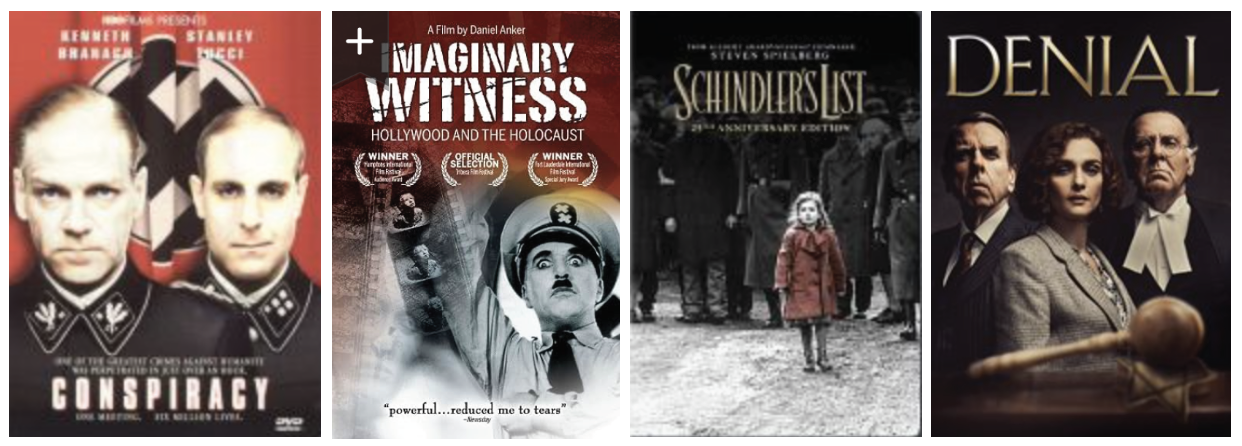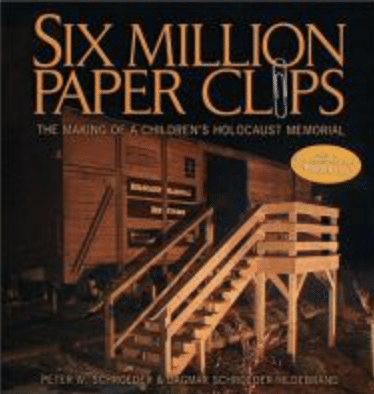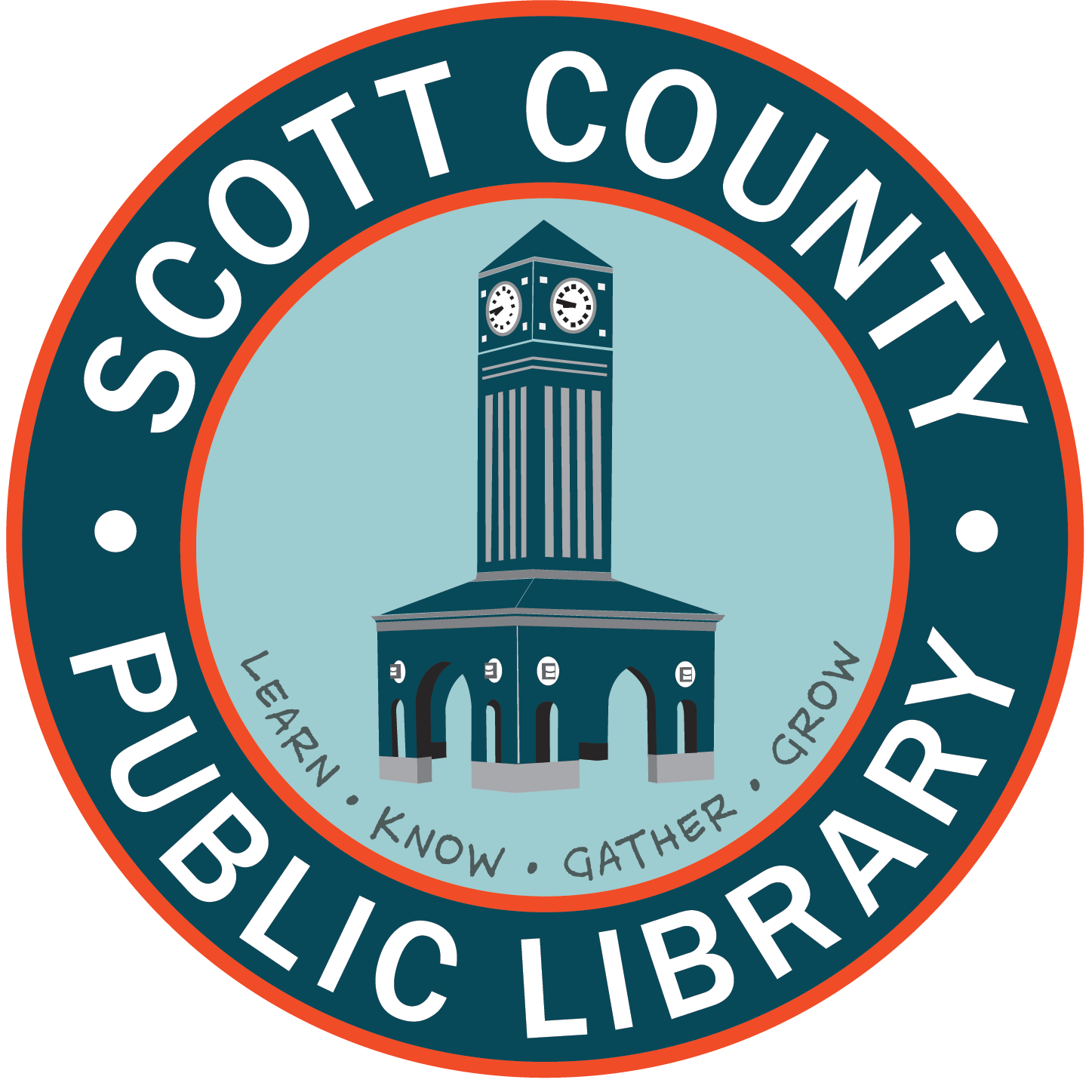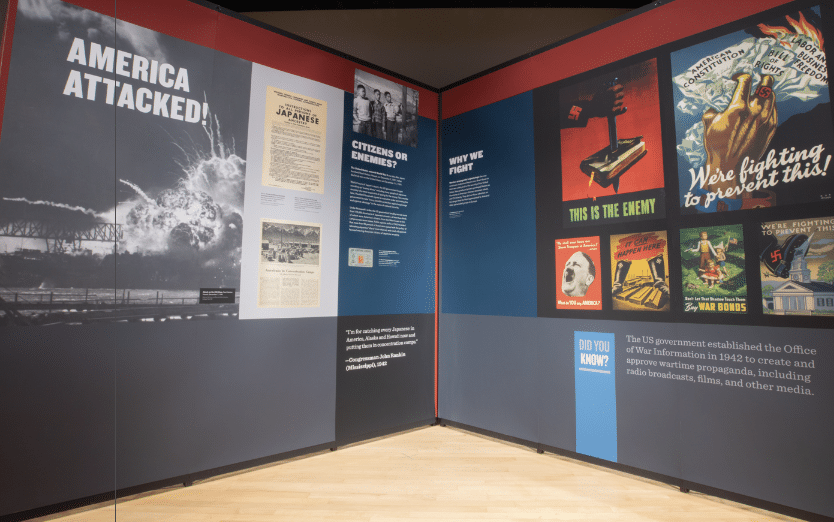Americans and the Holocaust
Upcoming Events
 November 9th, 5:30 pm-7:30 pm
November 9th, 5:30 pm-7:30 pm
Exhibit Opening: Americans and the Holocaust. Welcome to the official opening of the Americans and the Holocaust traveling exhibit on loan from the United States Memorial Museum in Washington, D.C. and made possible by grant and joint presentation with the American Library Association. Tonight we officially open the exhibit with a reception and present a preview of the amazing programs we will be hosting in the upcoming months. We are especially honored to have Alice Goldstein, a Holocaust survivor, as our guest of honor, who will be sharing a bit of her own family's experience with us.
Scott County Public Library is proud to have been chosen to host the only showing of this exhibit in Kentucky.
The exhibit will be open from November 9, 2023 until January 4, 2024 when the library is open. For more information, or to schedule a group tour, please contact the library at 502-863-3566 or email melissa.gibson@scottpublib.org.

Join us for our Book Discussions listed below
- November 1 @ 5 pm - In The Garden of Beasts by Erik Larson. This book discussion is part of the library’s ongoing Novel Idea Book Discussion schedule, but tonight we will be discussing Erik Larson’s nonfiction work that offers a fascinating view of Hitler’s Germany just prior to the war. In 1933, William Dodd was appointed the U.S. ambassador to Germany and moved to Berlin with his family. A historian and university professor by occupation, Dodd, sees the events and Nazi policies through a different lens than most Americans, indeed, differently than most of his fellow members of the state department.
- November 15 @ 6 pm - The Unwanted: America, Auschwitz, and a Village Caught in Between by Michael Dobbs Historian Michael Dobbs presents a chilling true story a few Jewish families to find refuge in another land, away from their homes and the lives they had created in a small village at the edge of the Black Forest. These people were upstanding citizens war heroes, and beloved business owners, who found themselves suddenly facing a chill from friends, colleagues and neighbors as life under the Nazis changed their world.
- November 16 @ 4 pm - When the World Was Ours by Liz Kessler Join us for an in-depth discussion of the book: When the World Was Ours by Liz Kessler. Please have the book read BEFORE this meeting. Special guest, Lisa Lair, retired public school teacher and educator. Ages 8-12y only. Please register.
- November 16 @ 6 pm - Maus I and Maus II by Art Spiegelman Tonight, we welcome professor Gerry Adair from BCTC as he leads a discussion jointly with our staff of Art Spiegelman's Pulitzer-Prize winning graphic novel Maus I & II which recounts his father's experiences as a Jew during the Holocaust.
- November 17 @ 5:30 pm - The Librarian of Auschwitz by Antonio Iturbe Fourteen-year-old Dita is one of the many imprisoned by the Nazis at Auschwitz. Taken, along with her mother and father, from the Terezín ghetto in Prague, Dita is adjusting to the constant terror that is life in the camp. When Jewish leader Freddy Hirsch asks Dita to take charge of the eight precious volumes the prisoners have managed to sneak past the guards, she agrees. And so Dita becomes the librarian of Auschwitz. Ages 12-18 only. Please register.
- December 4 @ 6:30 pm - Beyond Belief: The American Press & the Coming of the Holocaust 1933-1945 by Deborah Lipstadt The American Press & the Coming of the Holocaust 1933 - 1945 by Deborah Lipstadt. One of the big questions debated in discussions of the Holocaust and one that our current traveling exhibit hopes to answer, is what Americans knew about events in Europe and how soon did they know it. Special UN ambassador Deborah Lipstadt, famous for her court case against a noted Holocaust denier, strives to answer that question in this powerful book that takes a deep dive into America in the first half of the twentieth century and our news sources.
- December 6 @ 5 pm - Night by Elie Wiesel Night, by Elie Wiesel, is one of the most powerful books written about this turbulent time in history and offers a personal perspective and raw emotion that few works can match. Read and discussed in high schools, colleges, and adult book clubs, this slim volume has the ability to touch and enlighten all who read it.
- December 8 @ 12 pm & December 10 @ 2 pm - People Love Dead Jews: Reports From a Haunted Present by Dana Horn This discussion is part of the supporting programming for "Americans and the Holocaust," a traveling exhibit from the United States Holocaust Memorial Museum in conjunction with the American Library Association.
- December 21 @ 6:30 pm - The Book Thief by Markus Zusak Tonight, we will be hosting a special discussion of The Book Thief by Markus Zusak, the story Liesel, a foster child who discovers the power of books to light the darkness of life under the Nazis. This is a book accessible for teens and adults alike, and we hope to have an inter-generational discussion of this novel.
- January 3 @ 5:00 pm - History on Trial by Deborah Lipstadt Today we will be discussing Deborah Lipstadt's account of her legal battle against Holocaust denier David Irving. This meeting of the Novel Idea Book Discussion is the last of the book discussions connected to the traveling exhibit. You can also view this film on 12/30 @ 2 pm.

Join us for our Holocaust Film Series and stick around afterwards for discussion about the film.
- November 18 @ 2 pm - Conspiracy Conspiracy is the chilling film based on the only surviving records of a meeting between army and government officials that would determine the fate of millions of people. Starring Kenneth Branaugh and Colin Firth. Rated R. Following the film will be a discussion led by BCTC Associate Professor Gerry Adair, providing background and additional information on the film.
 November 29 @ 5:30 pm -
November 29 @ 5:30 pm -
6 Million Paperclips: The Making Of A Children's Holocaust Memorial The true story of students who helped quantify the horrors of the Holocaust. At a middle school in a small, all white, all Protestant town in Tennessee, a special after-school class was started to teach the kids about the Holocaust, and the importance of tolerance. The students had a hard time imagining what six million was (the number of Jews the Nazis killed), so they decided to collect six million paperclips, a symbol used by the Norwegians to show solidarity with their Jewish neighbors during World War II. German journalists Dagmar and Peter Schroeder, whose involvement brought the project international attention, tell the dramatic story of how the Paper Clip Project grew, culminating in the creation of The Children's Holocaust Memorial. Please register.
-
December 2 @ 2 pm - Imaginary witness: Hollywood and the Holocaust (Documentary) Imaginary Witness is a 2004 documentary directed by Daniel Anker and narrated by Gene Hackman which examines the American film and television industry's response to the Holocaust and its role in shaping public sentiment of the events happening overseas. How does an industry that peddles fantasy document horrific history? What role did cultural antisemitism play in attitudes towards Jews in the film industry and its products?
- December 16 @ 2 pm - Schindler's List See Spielberg's ground-breaking and powerful film depicting efforts of war industrialist Oskar Schindler to save Jewish lives, starring Liam Neeson and Ralph Fiennes. Rated R. Discussion will follow the film.
- December 30 @ 2 pm - Denial When Deborah Lipstadt speaks out against Holocaust denier David Irving over his falsification of history, she discovers that the stakes are higher than ever in the battle for historical truth. Now faced with a libel lawsuit in British court, Lipstadt and her attorney have the heavy burden of proving that the Holocaust happened, in a riveting legal fight with stunning consequences. Rated PG-13. You can also join the Book Discussion: History on Trial by Deborah Lipstadt on Wednesday, 1/3 @ 5 pm in Room J.
These programs are related to the Holocaust exhibit, but are not tied to books or films.
- November 4 @ 3 pm - A Workshop for Parents and Teaching the Holocaust: A Workshop for Parents and Teachers.
Andrew Burgoon and Kathy Owens, teachers in the Law & Justice Village of Elkhorn Crossing School in Georgetown, KY, will lead a reading and discussion of the life of Sylvia Farber Green as an example of the usage of survivor's stories in making the Holocaust accessible to students.
- November 6 @ 7 pm - Zelda Popkin: The Life and Times of an American Jewish Woman Writer
Dr. Jeremy Popkin (University of Kentucky) shares his grandmother with us in this newly published book that examines the life and contributions of an indominable woman who led an adventurous life. Working in the male-dominated and ruthless world of public relations in the 1920s, she began writing fiction in the 1940s, including the some of the fiction dealing with the Holocaust.
- November 10 @ 4 pm - Star of David Ornaments in Honor of Holocaust & Hanukkah (Ages 7y+)
Commemorating the Holocaust and in preparation for Hanukkah, fill star of David ornaments with well-wishes, hopes and dreams of peace, love and understanding.
- November 12 @ 2 pm - Roots of Antisemitism
Dr. Cliff Wargelin, chair of the History Department of Georgetown College, presents an informative examination of the roots of Antisemitism in the later 19th century, early 20th century Europe, focusing on issues such as Russian Anti-Semitic policies, radical right ideologies and movements, the Dreyfus Affair, and generalize cultural Antisemitism through Europe and the United States.
- November 13 @ 6:30 pm - Genocide: A History
The history of genocide as a concept is unfortunately a sad part of the human story, and is still an ongoing issue today. Gerry Adair, of Bluegrass Community and Technical College, shares the troubling history of this word, from the earlier genocides of the 20th century through the Holocaust of the 1930s and 1940s, and the ongoing tragedies happening around the world today.
- November 17 @ 5 pm - Virtual Holocaust Books for Tweens
Virtual. Book recommendations for the Holocaust in coordination with our Smithsonian exhibit. Age ranges will be given or each book. Lots of great variety.
- November 19 @ 2 pm - Resisting the Nazis: The Jewish Resistance
Dr. Ken Slepyan of Transylvania University, shares the stories of the Jewish resistance to Hitler's plans in far eastern reaches of Europe, within the Polish ghettos and the concentration camps themselves. Some who managed to flee Europe, leaving all they loved behind, volunteered to go back within the Allied forces to work as interpreters, spies, and soldiers on the front. Here are the stories of some of the bravest people on earth.
- November 19 @ 5:30 pm - Maggid: A Jewish Storytelling Initiative
This evening we welcome members of the Jewish community as they share family stories of their experiences during World War II. This is a priceless opportunity to share a very special time and and hear firsthand how this period of time changed their world forever. This program is suitable for older children, teens and adults and is brought to us through a partnership with the Jewish Federation of the Bluegrass.
-
November, 29 @ 5:30 pm "6 Million Paperclips: The Making Of A Children's Holocaust Memorial" --the Movie (Rec for Children in Grades 5+ & their families)
From Amazon: "The true story of students who helped quantify the horrors of the Holocaust. At a middle school in a small, all white, all Protestant town in Tennessee, a special after-school class was started to teach the kids about the Holocaust, and the importance of tolerance. The students had a hard time imagining what six million was (the number of Jews the Nazis killed), so they decided to collect six million paperclips, a symbol used by the Norwegians to show solidarity with their Jewish neighbors during World War II. German journalists Dagmar and Peter Schroeder, whose involvement brought the project international attention, tell the dramatic story of how the Paper Clip Project grew, culminating in the creation of The Children's Holocaust Memorial." Please register.
- November 30 @ 6:30 pm - Stories of the Holocaust from a Jewish Neighborhood (Ages 8+)
Special Guest Lisa Lair brings us stories from a Jewish Neighborhood from Holocaust survivors and tales of the Jewish traditions.
- December 1 @ 5 pm - Virtual Tween Book Bites: Jewish-inspired Books for Tweens (Ages 8-12)
Join our staff in Virtual Book Bites for book recommendations on Jewish-inspired books for tweens.
- December 3 @ 2 pm - America in the 1930's and 1940's: Challengers at Home
Whenever we think of the 1940s, we probably conjure images of WWII, but life in the United States during the pre-war years and the decade of the 1940s was rich and challenging in many ways. How did we view outsiders? What were the main concerns of the citizens? In trying to escape the horrors of their own country, many refugees found a much different America than they imagined if they even managed to get here. Dr. Tracy Campbell, of the University of Kentucky History Department will shed the light on this critical portion of our history that truly answers the questions asked by the "Americans and the Holocaust" exhibit: What did we do? What did we know? What would you have done?
- December 7 @ 6:30 pm - What is Hanukkah? Storytime and Presentation with Lisa Lair
Join Educator Lisa Lair as she explores the meaning & symbolism of Hanukkah with families and enjoy a Hanukkah storytime. Pease register if able - limited space.
- December 11 @ 6:30 pm - From Barbed Wire to Bluegrass: Jewish Refugees in Kentucky
Jewish Refugees in Kentucky. This presentation by Dr. Jacqueline Hamilton of the Kentucky Speakers Bureau and Eastern Kentucky University, honors Jewish refugees who escaped the horrors of Europe and found a new home in Kentucky. Drawn from Arwen Donahue's nonfiction work "This Is Home Now: Kentucky's Holocaust Survivors Speak", Dr. Hamilton shares their lives and experiences living both under the Nazis and in the American South. She ends the program in a candlelight memorial service. This presentation is made possible in part by the Kentucky Humanities Council and its generous donors.

